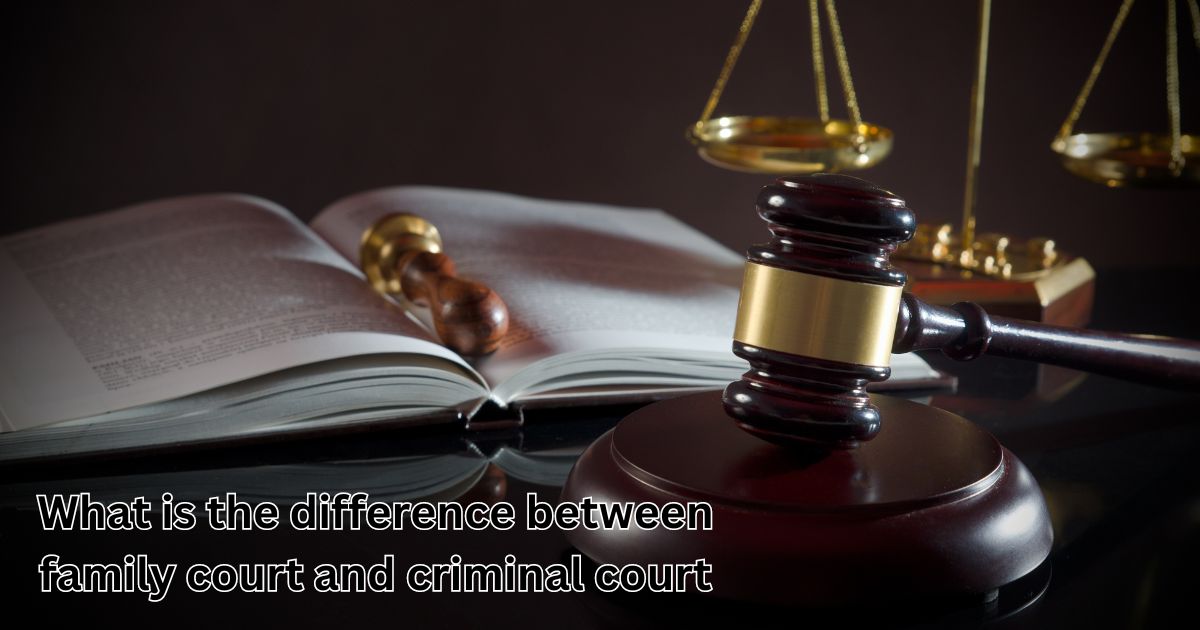Understanding the distinctions between family court and criminal court is essential for navigating the legal system. Knowing what is the difference between family court and criminal court helps clarify how each court plays a crucial role in upholding justice, but they serve different purposes and handle various types of cases. This article will explore the functions, processes, and key differences between these two types of courts.
Introduction
The legal system is comprised of numerous specialized courts, each designed to handle specific types of cases. Among these, family court and criminal court are two of the most frequently encountered. Family court deals with matters that affect familial relationships, such as divorce and child custody, while criminal court addresses violations of criminal law. Understanding these differences can help individuals make informed decisions and seek appropriate legal remedies. In this article, we will dissect the roles and functions of both courts, highlight their differences, and provide insights into when and why legal intervention might be necessary.
Definition of Family Court
Family court is a specialized court that focuses on cases involving family law issues. This includes a broad range of matters related to family relationships and personal affairs. The primary goal of family court is to resolve disputes that arise within the family unit and ensure fair and equitable outcomes for all parties involved.
Divorce and Separation
Divorce cases in family court involve the legal dissolution of a marriage. This process can be complex, as it often includes division of assets, spousal support, and other financial considerations. The court aims to equitably distribute marital property and determine spousal support based on factors like the length of the marriage, financial contributions, and future needs. Similarly, separation cases address the legal and financial responsibilities of spouses who choose to live apart but are not formally divorced. The court’s goal is to facilitate a fair division of responsibilities and ensure that both parties’ rights are protected during this transitional period.
Child Custody and Support
Child custody cases are a significant aspect of family court. The court determines custody arrangements based on the best interests of the child, which includes evaluating each parent’s ability to provide a stable and nurturing environment. Custody decisions can involve physical custody (where the child lives) and legal custody (who makes major decisions for the child). Child support cases address financial contributions from both parents towards the child’s needs. The court uses guidelines to calculate support amounts, considering factors like income, living expenses, and the child’s needs. Ensuring fair and adequate support is crucial for the child’s well-being and development.
Adoption and Guardianship
Family court also handles adoption and guardianship cases. Adoption involves the legal transfer of parental rights from birth parents to adoptive parents, and the process includes thorough background checks and home studies to ensure the suitability of the adoptive family. Guardianship cases occur when a child needs a legal guardian due to the parents’ inability to care for them. The court assesses the guardian’s ability to provide for the child’s needs and make important decisions regarding their welfare. Both adoption and guardianship are designed to ensure that children are placed in safe and supportive environments.
Definition of Criminal Court
Criminal court is a branch of the judiciary responsible for adjudicating cases where individuals are accused of violating criminal laws. The primary function of criminal court is to determine the guilt or innocence of defendants and to impose appropriate penalties for criminal behavior. Criminal cases range from minor offenses to serious felonies, and the court’s decisions can have significant impacts on the lives of those involved.
Misdemeanors vs. Felonies
Criminal court cases are generally classified into misdemeanors and felonies. Misdemeanors are less severe offenses, such as petty theft or disorderly conduct, and typically result in lighter penalties like fines or short-term imprisonment. Felonies, on the other hand, are more serious crimes, such as robbery or murder, and carry heavier penalties, including long-term imprisonment or even life sentences. The court’s role is to evaluate the evidence, determine the appropriate charges, and ensure that justice is served based on the severity of the crime.
Criminal Trials and Sentencing
Criminal trials are conducted to establish whether a defendant is guilty of the charges brought against them. The trial process involves presenting evidence, examining witnesses, and making legal arguments. The burden of proof rests with the prosecution, which must demonstrate the defendant’s guilt beyond a reasonable doubt. Sentencing follows a conviction and involves determining the appropriate punishment, which can include imprisonment, fines, probation, or community service. The court considers factors such as the nature of the crime, the defendant’s criminal history, and any mitigating or aggravating circumstances when imposing a sentence.
Key Differences Between Family Court and Criminal Court
While family court and criminal court both serve essential functions within the legal system, they operate under different principles and procedures. Understanding these differences is crucial for anyone involved in legal matters.
Jurisdiction and Scope
Family court has jurisdiction over cases related to family law and domestic relations. When considering what is the difference between family court and criminal court, it’s important to note that family court’s scope includes issues like divorce, custody, and child support, focusing on resolving disputes within the family unit. In contrast, criminal court handles cases involving criminal offenses, ranging from minor infractions to serious crimes. The scope of criminal court extends to enforcing laws, prosecuting offenders, and ensuring public safety. Understanding these differences can clarify how each court operates and the types of cases they address.
Types of Cases and Legal Issues
The types of cases in family court revolve around personal and familial relationships. Legal issues addressed in family court include the dissolution of marriage, child custody disputes, and adoption processes. In contrast, criminal court deals with violations of criminal law, such as theft, assault, or drug offenses. The legal issues in criminal court involve proving the defendant’s guilt and determining appropriate penalties for criminal behavior.
Also Read: Hancock Bird Meaning
Legal Representation
In family court, parties typically seek legal representation to navigate complex family law matters and advocate for their interests. Family law attorneys provide guidance on divorce proceedings, custody arrangements, and other family-related issues. In criminal court, defendants are represented by criminal defense attorneys who work to protect their rights, challenge the prosecution’s evidence, and negotiate plea deals or represent them during trial. Legal representation in criminal court is crucial for ensuring a fair trial and achieving the best possible outcome for the defendant.
Court Procedures
Family court procedures focus on resolving disputes and facilitating agreements between parties. The process often involves mediation, negotiation, and hearings to address issues such as custody arrangements or property division. Criminal court procedures are more formal and involve a series of legal steps, including arraignment, trial, and sentencing. The court follows strict protocols to ensure a fair and just legal process, with the prosecution bearing the burden of proof and the defendant presumed innocent until proven guilty.
Standards of Proof
The standard of proof in family court is “preponderance of the evidence,” meaning that one party’s evidence must be more convincing than the other party’s. This standard is lower than the criminal court’s standard of “beyond a reasonable doubt,” which requires the prosecution to prove the defendant’s guilt to the highest degree of certainty. The difference in standards reflects the varying levels of proof required for resolving family disputes versus criminal convictions.
Case Examples and Illustrations
To better understand the differences between family court and criminal court, consider the following examples.
Real-World Examples of Family Court Cases
An example of a family court case might involve a couple going through a divorce and needing to determine child custody arrangements. The court would evaluate each parent’s ability to provide a stable environment for the child and make decisions based on the child’s best interests. Another example could be an adoption case, where the court reviews the adoptive parents’ suitability and the child’s readiness for adoption.
Real-World Examples of Criminal Court Cases
A criminal court case example could involve a person charged with theft. The prosecution would present evidence to prove the defendant’s involvement in the crime, while the defense attorney would challenge this evidence and argue for the defendant’s innocence. Another example might be a serious assault case, where the court would assess the evidence, conduct a trial, and determine an appropriate sentence for the convicted individual.
Common Misconceptions
Misconceptions about family court and criminal court can lead to confusion and misunderstandings. Addressing these misconceptions is important for accurate knowledge of the legal system.
Myths About Family Court
One common myth about family court is that it primarily focuses on punishing individuals for their actions. In reality, family court aims to resolve disputes and facilitate fair outcomes for all parties involved, with an emphasis on the well-being of children and maintaining family stability. Another misconception is that family court decisions are permanent; in fact, the court can revisit and modify decisions as circumstances change.
Myths About Criminal Court
A common myth about criminal court is that it automatically results in severe penalties for defendants. While serious crimes can lead to harsh sentences, criminal court also considers mitigating factors and provides opportunities for plea bargains or reduced sentences. Another misconception is that criminal court always leads to incarceration; alternatives such as probation or community service are often used depending on the case and the defendant’s history.
When to Seek Legal Help
Knowing when to seek legal assistance is crucial for navigating both family court and criminal court effectively.
Situations Requiring Family Law Attorneys
Individuals facing divorce, child custody disputes, or adoption processes should seek the assistance of a family law attorney. These legal professionals can provide guidance on navigating the complexities of family law, represent their clients in court, and help negotiate fair settlements. Seeking legal help early can ensure that one’s rights are protected and that the best possible outcome is achieved.
Situations Requiring Criminal Defense Attorneys
Anyone facing criminal charges should consult with a criminal defense attorney. These attorneys are skilled in defending individuals accused of crimes, providing legal advice, and representing clients during trials or negotiations. Legal representation is crucial for ensuring that the defendant’s rights are upheld and that they receive a fair trial.
Conclusion
Understanding what is the difference between family court and criminal court is essential for anyone involved in legal matters. Family court focuses on resolving disputes related to family relationships, such as divorce and custody, while criminal court deals with violations of criminal law and the prosecution of offenders. Each court has its procedures, standards of proof, and types of cases it handles. Recognizing these distinctions can help individuals navigate the legal system more effectively and seek appropriate legal remedies.










